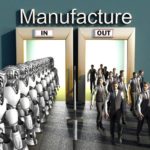 Last year, Satya Nadella announced the company’s desire for all of us to have a “Copilot” to help us navigate life. Copilot is a project hosted on GitHub that aims to outsource a huge amount of software development coders would ordinarily do themselves. It’s believed that the project speeds up the process of software development by around 50%. Amazon has its own version of the tool, called CodeWhisperer, with Alphabet also believed to have its own alternative.
Last year, Satya Nadella announced the company’s desire for all of us to have a “Copilot” to help us navigate life. Copilot is a project hosted on GitHub that aims to outsource a huge amount of software development coders would ordinarily do themselves. It’s believed that the project speeds up the process of software development by around 50%. Amazon has its own version of the tool, called CodeWhisperer, with Alphabet also believed to have its own alternative.
Such applications of AI conform to the narrative that it’s a technology that frees us from the drudgery of the mundane, everyday tasks that consume so much of our time and energy, thus freeing us up to do the creative and fundamentally human things that define us.
In I, Human, UCL’s Tomas Chamorro-Premuzic ponders whether this is actually the case or whether AI as it currently is enslaves us more than liberates us.
Automated thought
He argues that in many instances, it’s not the mundane things that are being automated but our very thought processes themselves. We’re not being freed up to think more as technology is doing that for us.
“There is not much evidence that the rise of AI has been leveraged in some way to elevate our curiosity or intellectual development, or that we are becoming any wiser,” he explains. “Our lives seem not just predicted, but also dictated by AI.”
It makes perfect sense from a technological perspective for so much of our lives to be automated, but it makes far less sense from our own. Much of our lives seem to be optimized for and by technology, and Chamorro-Premuzic suggests that we have far from becoming freed by automation and instead surrendered our humanity to it.
“Our very identity and existence have been collapsed to the categories machines use to understand and predict our behavior, our whole character reduced to the things AI predicts about us,” he continues.
AI Bosses
Nowhere is this more evident than in areas like the gig economy, where workers typically operate under an algorithmic “manager”. Research shows that while this can be extremely efficient, it’s generally dehumanizing for the workers themselves.
It was a situation replicated in a study by Alex Rosenblat into how Uber drivers feel about being managed by an algorithm. A follow-up study from Penn State highlighted some clear areas for improvement for companies deploying algorithmic managers.
It showed that while Uber’s AI performs many of the functions of a manager, drivers feel they have little ability to air grievances, pitch new ideas or even influence changes to their work, all of which would be possible with a human manager. This is compounded by the fact that most decisions made by Uber about their platform focus on the customer rather than the driver.
So, rather than freeing up people to be their best selves, it was instead stripping the humanity from them and turning them into little more than the slaves that Capek derived the name robota from. If AI is to live up to its promises of liberating us from drudgery then it’s something that urgently needs to be addressed.